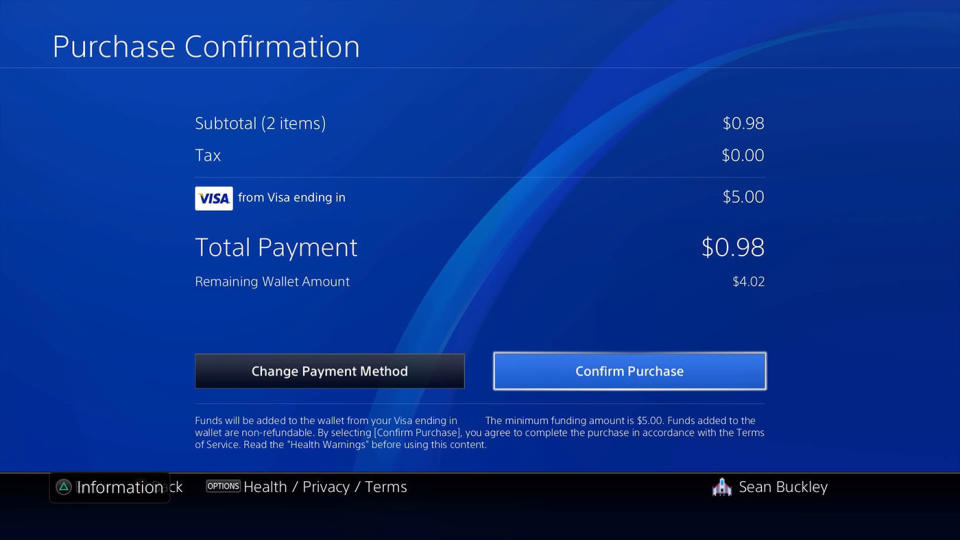PlayStation is still getting away with 'minimum funding' charges
Sony continues to embrace an anti-consumer practice that even Nintendo gave up.

When game consoles stumbled into the modern era, their digital-content stores were a mess. Nintendo's Wii locked its customers into an annoying point system. The Xbox 360 obfuscated the value of Microsoft Points by using an odd 0.8 conversion rate. Sony's PlayStation Store listed its items in real, local currency but still forced users to load up digital wallets with a minimum amount before purchasing anything on the marketplace. Over the years, Nintendo and Microsoft fixed their digital-currency problems, aping Sony's up-front pricing and even improving upon it by allowing users to buy content without requiring them to add funds to a wallet system. Sony, on the other hand, hasn't changed. If you don't promise to spend at least $5 in the PlayStation store, you're not allowed to buy anything at all.
This nagging problem has plagued the PlayStation Store for years. Want to pick up a $2 PSOne Classic during a Flash Sale? You'll be charged $5 for the privilege -- two for the game and three to linger in your PSN wallet. Just because. It's a policy that encourages consumers to return to the PlayStation Store to spend their leftover money, but it only accomplishes that by forcing customers to add more funds to the wallet system than are needed for certain purchases. These leftover funds can even compound the problem: If you have $7 in your wallet but want to buy a $10 game, you'll need to add that same minimum $5 to your account to buy it, two bills more than the total cost of the game.

It's a hostage situation. Sony's wallet allows it to hold its customers' own money over their heads as a means of forcing them to spend more in the PlayStation Store. It's also a haven for refund management, allowing disputed purchases to be returned to the PSN wallet but not the customer's bank accounts. It's true, Sony's competitors once employed this tactic as well -- but Nintendo's and Microsoft's days of hoarding consumer cash ended when they retired their anachronistic point systems.
So why the minimum price? One possible reason is an effort to avoid merchant transaction fees by passing on the cost of running a credit card to the consumer. This practice actually used to be prohibited by most card networks but became legal in 2010 when the right to require a minimum charge was included in the Dodd-Frank Wall Street Reform and Consumer Protection Act. Sony's minimum-wallet policy is completely legal. It also happens to be frustrating and completely anti-consumer.

On the other hand, some DLC add-ons can sell for as little as $0.49. Without a minimum-purchase threshold, Sony would run the possibility of losing money on some sales. Still, when even Nintendo recognizes that mandatory-buying thresholds create a bad online experience, you have to wonder if Sony is making the right choice.
It's possible that I'm just a whiner. Maybe the majority of PlayStation customers don't buy content under $5 and never encounter this niche problem. Maybe I'm not patient enough. After all, consumers can get around it by timing purchases carefully or, in some cases, buying redemption codes for PSN content at GameStop -- but these work-arounds shouldn't be necessary. The PlayStation Store used to be the best online marketplace for console gamers, a beacon that showed its competitors a better way to serve a customer base ravenous for digital content. Now it's hamstrung by a single, archaic policy. It's not a reason to buy an Xbox over a PlayStation, but Sony's customers deserve better. The PlayStation Store can be the best digital marketplace again. All it needs to do is make one crucial change.

